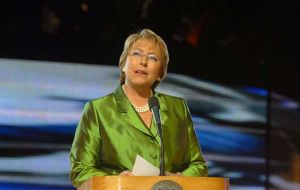MercoPress. South Atlantic News Agency
Ibero-American Summit begins in Chile
 President Michelle Bachelet addresses the opening ceremony
President Michelle Bachelet addresses the opening ceremony The 17th Ibero-American summit kicked off Thursday, bringing together Spanish and Portuguese-speaking countries in Latin America, Spain, Portugal, and Andorra, to discuss regional social issues and bilateral problems between neighbors.
Chilean President Michelle Bachelet is hosting the Thursday-Saturday meeting also attended by UN Secretary General Ban Ki-moon, Spain's King Juan Carlos and 21 other heads of state and government. Most leaders were in time for Thursday's gala dinner, except for Venezuelan President Hugo Chavez, who was delayed by unrest at home stemming from his controversial constitutional reforms. He is expected to arrive on Friday. The summit agenda's top issue is launching a program for Latin American regional social equality, an ambitious project that opens with a tax reform agreement to be signed Saturday to provide a regional fund for social improvements. Summit leaders also hope to make headway with several festering problems that are troubling relations between some neighbors. Center stage goes to recently renewed efforts to negotiate in Colombia a prisoners-for-hostages deal between President Alvaro Uribe's government and the rebel Revolutionary Armed Forces of Colombia, in which Chavez is a mediator. Chavez is expected to meet with Uribe on the sidelines of the summit in hopes of advancing in the exchange of some 50 prominent FARC hostages and 500 jailed FARC rebels. The Venezuelan leader is also likely to reiterate his desire to rejoin the Andean Community of Nations, from which he withdrew in 2005. Also acting as mediator, the King of Spain met Thursday with the foreign ministers of Spain, Argentina and Uruguay to discuss a way out of a festering dispute over a Finnish pulp factory being built in Uruguay on a river that separates it from Argentina. Chile and Bolivia, on their part, are hoping to move their negotiations forward on land-locked Bolivia's claim to a port on the Pacific Ocean it lost in a 19th century war with its neighbors. Both countries broke off diplomatic relations over the dispute in 1978. Special attention at the summit will be given to the freshly elected presidents of Argentina, Cristina Kirchner -- the country's first woman president, and Alvaro Colom of Guatemala. Colom, who will take office in January, was attending as president-elect of his country, but Kirchner was at the summit as Argentina's first lady accompanying her husband, President Nestor Kirchner, from whom she will be taking over next month.




Top Comments
Disclaimer & comment rulesCommenting for this story is now closed.
If you have a Facebook account, become a fan and comment on our Facebook Page!